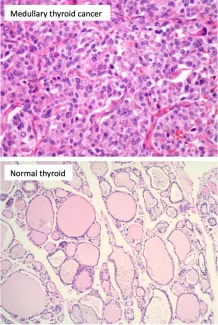Medullary thyroid cancer: incorporating the patient perspective to inform management of advanced disease.

Medullary thyroid carcinoma (MTC) is a rare tumor with a current prevalence in the United States of 13,500 patients. Advanced disease is mortal; patients with non-local metastases have 5- and 10-year survival rates of 26% and 14%, respectively. Recently, the FDA approved two new drugs, vandetanib and cabozantinib, for the treatment of progressive, metastatic MTC. Unfortunately, these drugs are not curative, response to therapy is not durable, and clinical practitioner experience with these compounds remains limited due to the rarity of the disease. Quality of life was not definitively studied as a goal of therapy in the trials for either drug, and consequently little is known about how patients with advanced MTC make decisions and weigh priorities in choosing whether to take newly approved drugs and/or participate in clinical trials. Understanding the natural history and disease course of MTC is critical to optimizing treatment regimens.
To address this need, we are building a multi-institutional registry of MTC patients to investigate the pathway to progressive disease requiring drug therapy, integrating patient perspective for the first time to identify patient-reported outcome measures that must be considered in optimizing treatment protocols and in clinical trial design.
The objective of this study is to define the natural history of MTC by fully characterizing the longitudinal course of the disease from both the clinical and patient perspectives. These data will be utilized to identify demographic, clinical, pathologic, and genotype predictors of progression to advanced MTC that requires approved drugs or enrollment in clinical trials, and document patient response to these therapies. To capture the patient experience with the progressive stages of MTC and the initiation of treatment, we will collect a longitudinal evaluation of patient-reported outcomes including quality of life, symptoms, and other outcome metrics. These data will critically guide and inform the development and clinical trial design of emerging drug therapies for advanced MTC.
This work is supported by a grant from the National Institutes of Health (5R01 FD006650-04).
